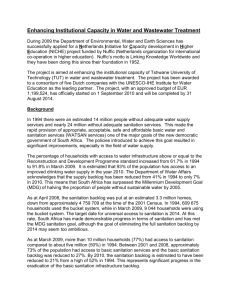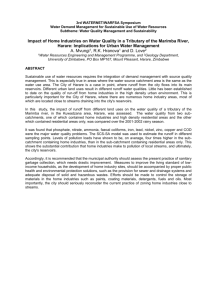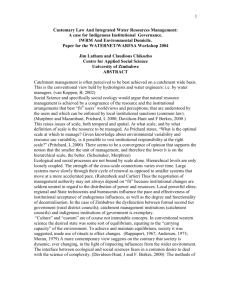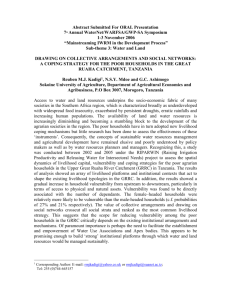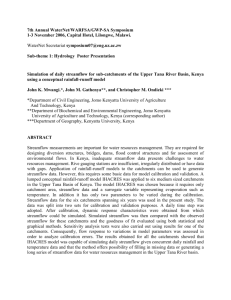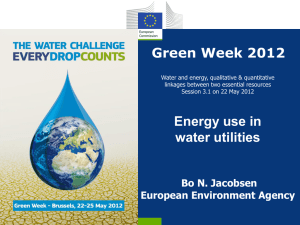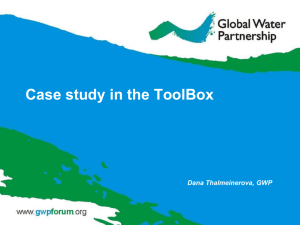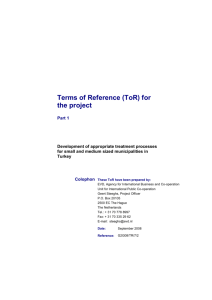Cross-Border Education in Africa for Global Geoinformation – Focus on WaterNet.
advertisement
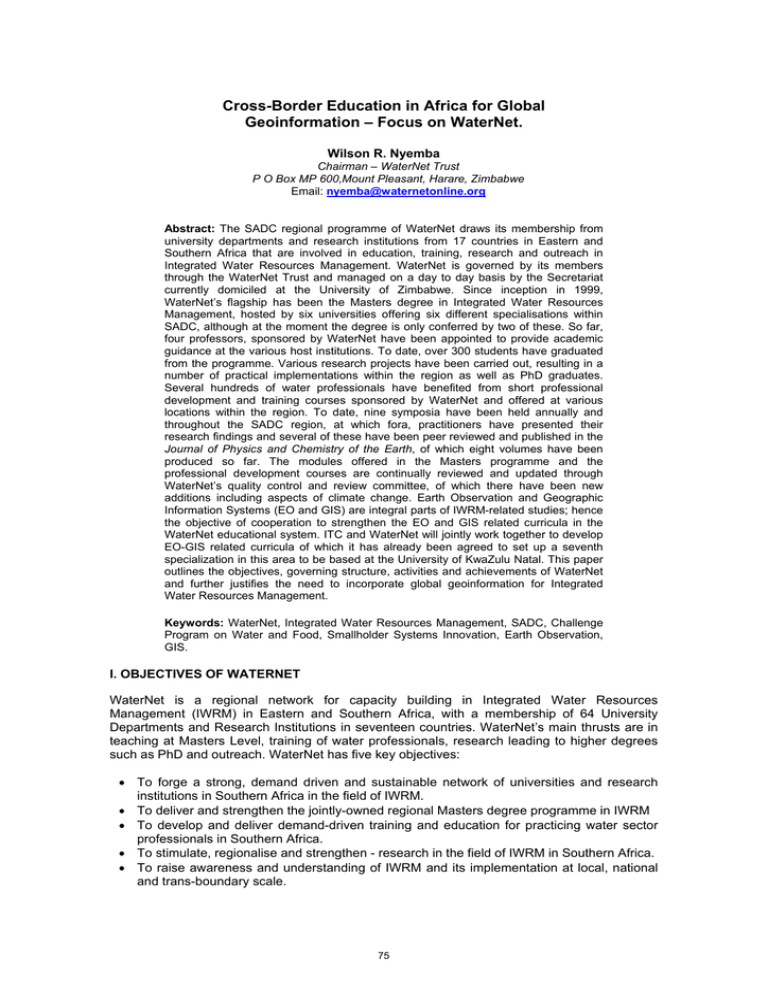
Cross-Border Education in Africa for Global Geoinformation – Focus on WaterNet. Wilson R. Nyemba Chairman – WaterNet Trust P O Box MP 600,Mount Pleasant, Harare, Zimbabwe Email: nyemba@waternetonline.org Abstract: The SADC regional programme of WaterNet draws its membership from university departments and research institutions from 17 countries in Eastern and Southern Africa that are involved in education, training, research and outreach in Integrated Water Resources Management. WaterNet is governed by its members through the WaterNet Trust and managed on a day to day basis by the Secretariat currently domiciled at the University of Zimbabwe. Since inception in 1999, WaterNet’s flagship has been the Masters degree in Integrated Water Resources Management, hosted by six universities offering six different specialisations within SADC, although at the moment the degree is only conferred by two of these. So far, four professors, sponsored by WaterNet have been appointed to provide academic guidance at the various host institutions. To date, over 300 students have graduated from the programme. Various research projects have been carried out, resulting in a number of practical implementations within the region as well as PhD graduates. Several hundreds of water professionals have benefited from short professional development and training courses sponsored by WaterNet and offered at various locations within the region. To date, nine symposia have been held annually and throughout the SADC region, at which fora, practitioners have presented their research findings and several of these have been peer reviewed and published in the Journal of Physics and Chemistry of the Earth, of which eight volumes have been produced so far. The modules offered in the Masters programme and the professional development courses are continually reviewed and updated through WaterNet’s quality control and review committee, of which there have been new additions including aspects of climate change. Earth Observation and Geographic Information Systems (EO and GIS) are integral parts of IWRM-related studies; hence the objective of cooperation to strengthen the EO and GIS related curricula in the WaterNet educational system. ITC and WaterNet will jointly work together to develop EO-GIS related curricula of which it has already been agreed to set up a seventh specialization in this area to be based at the University of KwaZulu Natal. This paper outlines the objectives, governing structure, activities and achievements of WaterNet and further justifies the need to incorporate global geoinformation for Integrated Water Resources Management. Keywords: WaterNet, Integrated Water Resources Management, SADC, Challenge Program on Water and Food, Smallholder Systems Innovation, Earth Observation, GIS. I. OBJECTIVES OF WATERNET WaterNet is a regional network for capacity building in Integrated Water Resources Management (IWRM) in Eastern and Southern Africa, with a membership of 64 University Departments and Research Institutions in seventeen countries. WaterNet’s main thrusts are in teaching at Masters Level, training of water professionals, research leading to higher degrees such as PhD and outreach. WaterNet has five key objectives: • To forge a strong, demand driven and sustainable network of universities and research institutions in Southern Africa in the field of IWRM. • To deliver and strengthen the jointly-owned regional Masters degree programme in IWRM • To develop and deliver demand-driven training and education for practicing water sector professionals in Southern Africa. • To stimulate, regionalise and strengthen - research in the field of IWRM in Southern Africa. • To raise awareness and understanding of IWRM and its implementation at local, national and trans-boundary scale. 75 II. STRUCTURE OF WATERNET Although WaterNet is a regional program of the SADC Water Sector, there are 3 institutions from East Africa (Uganda and Kenya) who became members of WaterNet at inception, i.e. before WaterNet became a fully fledged SADC programme. Hence it was decided that these will be retained as full members. 1 WaterNet members are represented in the annual general meeting (AGM); which is the overall governing body of WaterNet. Member Member Member Member Represented in : Advice and support 1 AGM Elect periodically 2 2 Periodically the AGM elects the Board of Trustees in accordance with specific election procedures. The WaterNet Board of Trustees are accountable to the AGM, as specified in the Deed of Trust. Accountable to: WaterNet Board of Trustees 5 Advice and support Advice and support WaterNet Trust Supporting members Hires: 3 Accountable to: Funds: 4 Staff WaterNet (incl. Manager) Donors Accountable to: Executes: Projects Projects Projects 3 The staff of WaterNet has an employer-employee relationship with the WaterNet Trust, governed by employment contracts 4 Basket funding from multiple donors provide the financial resources for WaterNet’s activities. The WaterNet Trust is accountable to the donors as specified in the grant agreements. 5 Supporting members may be involved; governed by a contract between the WaterNet Trust and the supporting member. Figure 1. WaterNet Structure WaterNet has 3 categories of membership: Full Members This is WaterNet’s main class of membership and these are mainly University departments drawn from the SADC region. University departments and research institutions that are involved in teaching or research in Intergrated Water Resources Management are eligible to apply for membership. Full members have access to the various funds administered by WaterNet as long as they are in good standing. Associate Members WaterNet collaborates with various other institutions the world over and it was thus decided that university departments and research institutions outside the SADC region but who are carrying out similar activities would be eligible for membership. However this class of membership is somewhat limited as they do not have access to some of the funds availed to full members. Currently WaterNet has one Associate Member, i.e. National University of Rwanda. Supporting Members WaterNet collaborates with a number of organisations that may or may not be directly involved in teaching and research in IWRM. Supporting members are co-opted into WaterNet to provide support, guidance and advice in some of the aspects of WaterNet’s key objectives. Supporting members may be involved in WaterNet activities through contracts signed between them and the WaterNet Trust. Currently WaterNet has six supporting members: 76 • • • • • • The Directorate General for Development Cooperation of the Netherlands (DGIS) and The Swedish International Development Cooperation (Sida), both as cooperating partners and for the provision of financial support UNESCO-IHE for the provision of scientific backstopping SADC Water Division Global Water Partnership – Southern Africa (GWP-SA) WaterNet Alumni Association WaterNet’s full members are represented in the annual general meeting (AGM); which is the overall governing body of the WaterNet Trust. Associate and Supporting Members are also invited to the AGM to provide advice and support but only full members can make decisions or vote at such meetings. Periodically the AGM elects the Board of Trustees in accordance with specific election procedures. The WaterNet Board of Trustees is accountable to the AGM, as specified in the Deed of Trust. The executive committee of the AGM is the WaterNet Management Board, consisting of the elected Trustees and the six representatives of supporting members. The Management Board carries out work on behalf of the Trust, throughout the year and then reports to the AGM at the end of every year. However, just as in the AGM, decisions of the Management Board are made by the Trustees only. The supporting members are co-opted into the Management Board to provide guidance and advice. The day to day operations of WaterNet are overseen by the Secretariat, currently hosted by the University of Zimbabwe. The Secretariat is headed by a Manager, below which are three key positions, Research Coordinator, Administrator, Programme Officer and Finance Officer. The staff at WaterNet have an employer-employee relationship with the WaterNet Trust, governed by employment contracts. The Manager is accountable to the Management Board. Basket funding from multiple donors provide the financial resources for WaterNet’s activities. The WaterNet Trust is accountable to the donors as specified in the grant agreements. Currently WaterNet is sponsored by DGIS and Sida and lately, contributions made by members in the form of membership subscriptions. In addition to the structure, explained in the previous section, WaterNet has several governing documents as illustrated below. Member Member Member Member Represented in : Advice and support Accountable to: WaterNet Board of Trustees Advice and support WaterNet Trust Advice and support 3 AGM procedures, specifying procedure for calling, organizing and having the AGM. 3 Elect periodically Supporting members 2 Membership Agreement, specifying duties and rights. 2 AGM 8 1 WaterNet Membership application form. 1 Accountable to: Hires: 5 4 Funds: 7 Staff WaterNet (incl. Manager) Executes: 4 WaterNet Deed of Trust, defines the structure, duties and rights of the trust members and Board of Trustees. Acts as the WaterNet Constitution. Donors Accountable to: 6 Projects Projects Projects Figure 2. WaterNet’s Governing Documents 77 5 Employment contracts between WaterNet Trust and staff members. 6 Internal procedures, specifying internal rules of conduct for staff. 7 Grant agreements between WaterNet Trust and donor, governing disbursement and reporting on funds. 8 Contract agreements, specifying support, compensation and reporting, between WaterNet Trust and Supporting members. III. INSTITUTIONAL ARRANGEMENTS Education Since inception, WaterNet’s flagship has been the Masters degree in Integrated Water Resources Management. The first intake of graduate students was in 2003 and two groups of 15 students each were enrolled at the University of Zimbabwe and the University of Dar es Salaam. University of Zimbabwe (UZ) University of Dar es Salaam (UDSM) MSc - IWRM MSc - IWRM (Water Resources Management) (Hydrology) Polytechnic of Namibia (PON) University of the Western Cape (UWC) University of Malawi (UNIMA) University of Botswana (UB) (Water for People) (Water & Society) (Water & Environment) (Water & Land) University of KwaZulu Natal (UKZN) (Earth Observation & GIS) The long term plan for the WaterNet Masters regional program was to introduce specialisations for the program to enable students, in their second semester, to follow options of their choice depending on their backgrounds. This idea gave rise to the establishment of the first three specialisations in 2004: Water Resources Management (dealing with water allocation and catchment management) at the University of Zimbabwe, Hydrology (dealing with hydrological processes, water availability and distribution) at the University of Dar es Salaam and Water for People (dealing with water supply and sanitation) at the Polytechnic of Namibia. Two more specialisations were established a year later, i.e. Water and Society (dealing with the social and economic aspects of water) at the University of the Western Cape and Water and Environment (dealing with water quality and environmental management) at Chancellor College, University of Malawi. Lastly, the Water and Land specialisation (dealing with water for agriculture) was established at the University of Botswana. However the UZ and UDSM continue to be the only two universities registering and conferring the Masters degree while the other 4 institutions play a supporting role by offering the specialisations as well as assist where necessary with the students’ dissertations. The Masters degree in IWRM is an 18 month programme of which all students attend compulsory modules at UDSM and UZ for 6 months, followed by specialisations of their choice in the next 6 months. At the end of each of the modules, the students are examined and marks are forwarded to the university in which they are registered, either UZ or UDSM. In the last 6 months the students carry out a research project at any of the 6 institutions and the results for the dissertation are also forwarded to the university in which they are registered. Lecturers for the compulsory modules, the specialisations and supervision of dissertations are drawn from the host institutions as well as from UNESCO-IHE and Technical University of Delft. WaterNet’s curriculum is continually reviewed by its Quality Control and Review Committee. This has resulted in the recent introduction of a module on Climate Change as a compulsory module offered at the 2 core host institutions. UDSM and UZ in collaboration with Institute of Environmental Studies at UZ successfully sought funds from the British Council through the DelPHE project to develop specific modules dealing with climate change, to be incorporated in the IWRM program. 78 To date 316 students have graduated with the MSc in IWRM from UZ and UDSM, of which 268 of these were funded by WaterNet. A sizeable proportion of these graduates are women, i.e. 41%. WaterNet has also set aside funding for Professorial Chairs to provide academic guidance and leadership to the first 5 host institutions. Four of these, namely UZ, UDSM, PON and UWC are already in place and that for UNIMA will be in place shortly. It is WaterNet’s long term plan to have each of the 6 universities offer fully fledged Masters degrees in IWRM, similar to UZ and UDSM. This has been prompted by the increasing demand for this program. Every year WaterNet receives over 300 applications and it has not been an easy task to select the best 30. (15 UZ and 15 UDSM). The limited numbers have also been partly due to limited source of funding. The WaterNet Trust has already approved plans to introduce a seventh specialisation on Earth Observation and GIS at the University of KwaZulu Natal in collaboration with ITC. In November 2009, WaterNet signed a memorandum of understanding with ITC. Earth Observation and Geographic Information Systems (EO and GIS) are integral parts of IWRM-related studies, research and plans hence the objective of cooperation to strengthen the EO and GIS related curriculum in the WaterNet educational system. ITC and WaterNet will jointly work together to develop EO-GIS related curricula, case-studies, MSc/PhD research and joint projects. Some of these changes are as a result of demand and recommendations by WaterNet’s Quality Control and Curriculum Review Committee which meets frequently to assess the content and quality of the modules. The use of spatial information and the gathering, storage and manipulation of data, coupled with knowledge of hydrology and proper modelling are the main requirements for the development of realistic integrated water resources management plans. This has been one of the major driving factors to the proposed introduction of the EO and GIS specialisation. Training In addition to offering the Masters degree in IWRM, WaterNet has been involved, mainly in funding for short courses for continuous professional development. This has been targeted at water managers within the region as well as former graduates of the IWRM program. This is meant to continually equip participants with skills based on recent research results. To date, WaterNet has funded a total of 22 Professional Training Courses, of which a total of 573 participants were trained. These courses normally run for periods ranging from about 3 to 10 days and have been conducted at various locations within the SADC region. Resource persons are drawn from participating institutions within the region and some renowned institutions in Europe, such as UNESCO-IHE and TU-Delft. WaterNet’s long term plan is to use the Masters modules as short professional courses in which participants from industry attend as occasional students together with the regular Masters students. This has already been implemented in a number of the specialisations. Research WaterNet has been actively involved in research in IWRM. Numerous publications have been produced and quite a number of research recommendations have been implemented. Notable examples are: Challenge Program on Water and Food (CP PN17) (Limpopo Basin) The objective of this project was to improve the provision of water for productive use in such areas as food and livestock production. Partnerships with organisations such as ICRISAT have resulted in the implementation of most of the recommendations, such as improved water conservation as well as rainwater harvesting. The first phase for the Challenge Program was successfully concluded in August 2009. Seven students were registered for PhDs under the Challenge Program funding, one has graduated, three will be defending their theses soon and the other three are still carrying out their analysis. 79 Smallholder Systems Innovation (SSI)(Pangani and Thugela Basins) The SSI program was established with a broad objective of improving water management in agriculture for small holder farmers (households) for improved food production. This has been in practice in Tanzania and South Africa. Four PhD students were enrolled on this project, two have graduated and the other two will be defending their theses soon. There are various other research projects that have been carried out and all in all, there has been improved networking and provision of guest lecturers on the Masters degree in IWRM. Plans are already underway to prepare a bid for the Challenge Program Phase II. A number of PhD students will be completing their work in the next year or two. Research projects in the Zambezi and Incomati Basins have already started and these will support on-going research by Masters and PhD students. Plans are also underway to resuscitate the Water Research Fund for Southern Africa (WARFSA) Outreach WaterNet has successfully showcased its activities and accomplishments through various means, notably the annual symposia, which have successfully been held every year for the past 10 years. The WaterNet symposia, co-funded and co-organised by GWP-SA and WARFSA, annually bring together practitioners and experts in water to present research findings and these have been very good opportunities for networking with experts within the region and abroad. The various symposia have so far been held as follows: • • • • • • • • • 2000 in Maputo, Mozambique. 2001, Cape Town, South Africa 2002, Dar-es-Salaam, Tanzania 2003, Gaborone, Botswana 2004, Windhoek, Namibia 2005, Ezulwini, Swaziland 2006, Lilongwe, Malawi 2007, Lusaka, Zambia 2008, Johannesburg South Africa Ideally the venues for the symposia are supposed to be rotated within the SADC states. In 2009, Uganda successfully bid to host the symposium. It was the first non-SADC state to do so as WaterNet has some of its founding members in East Africa, Kenya and Uganda specifically. This year, the WaterNet AGM unanimously agreed to have the symposium hosted by Zimbabwe and this will be held at the Elephant Hills Hotel from 27 – 29 October 2010. This has th been strategically arranged to coincide with WaterNet’s 10 anniversary, a very strategic decision indeed, considering that it was in Victoria Falls in 2000, that the WaterNet Vision and Mission statements were crafted and the network forged. Several papers have been presented at these symposia and some of them have been peer reviewed and published in the Journal - Physics and Chemistry of the Earth, an international journal published by Elsevier. So far 8 issues of the journal have been published and a total of 373 articles produced. Recently and starting with the symposium in Johannesburg in 2008, the International Association of Hydrological Sciences (IAHS) have been brought on board, meaning that the symposia is no longer just a regional affair but an international one. WaterNet has also funded the publication of two books, co-authored by academics from member institutions: 1. Playing the Water Dance – Lewis Jonker (UWC) and Emmanuel Manzungu (UZ) 2. Innovative Practices in the African Water Supply and Sanitation Sector – Edited by Marco Schouten & Edwin Hes (UNESCO-IHE) and Zvikomborero Hoko (UZ) 80 Following the last symposium held in Uganda, an international conference was held at the same venue. This drew participants from three water networks of the southern hemisphere and this was dubbed, Three Southern Continents Meet. Apart from Waternet, there were participants from SACI Waters (Crossing Boundaries) of South Asia and Concertacion of Latin America. Among other issues that were discussed, it was agreed in principle that the three networks collaborate in their activities and starting this year, WaterNet has invited and will fund participants from the two networks to attend the symposium and they have pledged to reciprocate. So, in essence, the regional symposium will gradually become a truly international one. III. CONCLUSIONS Over the last 10 years WaterNet has made great achievements in the four areas of education, training, research and outreach in IWRM. The WaterNet Masters program has seen a considerable number of water professionals trained by academics from within the region and also from UNESCO-IHE and Technical University of Delft, both in the Netherlands. Four Professors, drawn from the region have so far been appointed to provide academic guidance and leadership to the host institutions. Several research articles have been published in the international Journal of Physics and Chemistry of the Earth. Following the signing of the Memorandum of Understanding between WaterNet and ITC, WaterNet is looking forward to fruitful cooperation in the area of Earth Observation and GIS, ably guided by ITC especially in view of the introduction of the seventh specialisation to be based at the University of KwaZulu Natal. The concept has received full support from the WaterNet membership. 81
